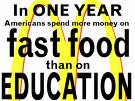The Substitutability of Knowledge and Power (BW)
There is a striking difference in attitudes toward knowledge between the classical political economists and neo-classical economists. In this respect, Friedrich Hayek and Karl Popper stand with the classical political economists in holding that an epistemologically robust sense of knowledge is an institution that emerges as an unintended consequence of multiple agents agreeing to common means to pursue disparate ends. Instead of each set of parties to a transaction having to expend effort confirming the fairness of each exchange for themselves, they agree to standards that can be used across many transactions — indeed, to such an extent that it becomes an object in its own right pursued for its own sake. In that respect, epistemic institutions resemble financial ones, even in characterizing their most self-involved activities as "speculation."
However, neo-classical economics radically relativizes, even subjectivizes, knowledge as a pure utility. Bracketing the niceties of epistemology, it defines knowledge (normally equated with "Information") as whatever determines the market strategy of an agent, understood as either producer or consumer. This definition brushes aside several issues: Must the agent be able to articulate the knowledge in question as a theory? Indeed, is it even necessary that the agent embody the knowledge in her proper person, as opposed to, say, in some other agent or some machine at the agent's disposal? After all, economists have no trouble including computer forecasts of the market among the agent's epistemic resources. But most distressing to the epistemologist is that "epistemic quality control" is always relative to the task at hand. To an economist, the epistemologist's overriding concern with the quality of available knowledge makes as much sense as endlessly refining a tool with no clear application in sight.
Ultimately "knowledge" for the economist — and henceforth I mean "neo-classical economist" — is whatever enabled the presumptively efficient agent to choose between various ways of investing her efforts. Thus, the thoroughness of the agent's search and the reliability of her findings are hardly ever raised — and when they are, the economist's intuitions tend to go against those of the epistemologist's. Whereas the epistemologist would advise the agent to delay any decision until "all the evidence is in," the economist would steer the agent away from regarding the search process as an end in itself, recalling that the agent is motivated to search for knowledge only in order to eliminate undesirable options for action. After all, the search itself involves consumption of the same resources that the agent will subsequently deploy in production. Once the agent learns enough to eliminate all but one option, the economist declares the search complete. Thus, its epistemological crudities notwithstanding, the economist's definition of knowledge highlights an intimate relation between knowledge and power: knowledge is what enables you to get what you want at a price.
Nevertheless, economists have been just as reluctant as epistemologists to embrace the knowledge-power equation. Here we need to recall the typical definitions of power proposed by political theorists, according to which power is, as they say, divisible. Imagine a pie: even if it is divided into pieces of equal size, the piece I get is withheld from you. On the present point, I exert power over you only if I can get you to do something that you would not have done in my absence. In other words, when I have power over you, it is not your resistance — but only my self-restraint — that prevents you from doing what I want. This runs counter to the definition of knowledge at least nominally shared by economists and epistemologists, both of whom regard knowledge as indivisible: Neither officially regards knowledge as a scarce resource that remains asymmetrically allocated among relevant parties, unless a theory of distributive justice is drawn up. Rather, any knowledge that I have must be accessible to you, if it is to count as knowledge.
The most striking consequence of this commitment to knowledge's indivisibility is that epistemologists have ignored knowledge's diverse material containers, such as books, brains, databanks, and communication network, despite the different costs involved in getting access to the knowledge they contain. In fact, rather than making this point a matter for empirical disputation, epistemologists usually presume that only that which can be conserved as it is conveyed through diverse containers — that is, "content" — can have genuine epistemic import. But what if one were to relativize the distinction between the container and the contained (or content) of knowledge?
Although I shall presume that a neat distinction can be drawn between the indivisible, symmetrically available qualities of knowledge and the divisible, asymmetrically available qualities of power, recent work in personal identity theory, spearheaded by the Oxford philosopher Derek Parfit, suggests that the difference between the indivisible and the divisible, and hence between knowledge and power, are more apparent than real.
To appreciate this radical claim, let us start with a truism: A change in my state of knowledge enables me to exert power over my present self by narrowing down the range of possible future selves that it can become. Now consider these two claims, one pertaining to a change in my state of knowledge (especially as an economist or an information scientist would see it) and the other to a change in my state of power (especially as a political theorist would see it):
K: I can do what I want because I have reduced my options to one.
P: He can do what I want because I have reduced his options to one.
Assuming the epistemic superiority of the present over the past in determinmg the future, the self-control "I" exert in K is an exact analogue of the asymmetrical power relation "I" exert over "him" in P. Little more than a narrative convention leads us to treat K as involving one person and P as involving two. Perhaps the most intuitive way of getting at the "mere" conventionality of my being the same person across time in K is by considering regret, which is based on the fact that my frame of mind at the time a decision takes effect will be different from my frame of mind at the time I originally made the decision: what seemed good then may, even if brought about as planned, seem not so good later. Parfit argues that there is no principled difference between my regret here and the regret I would feel if I did something on someone else's behalf that I turned out to be against their best interest.
This conventionalizing of the difference between "self" and "other" carries implications for the moral dimension of power, as evidenced in ascriptions freedom and responsibility. When I eliminate uncertainty from my course of action, I become empowered, but when I eliminate it from someone else's of action, she becomes constrained. The most otiose and trenchant positions in philosophy — egoism, skepticism, and solipsism — arise by drawing a hard boundary between ourselves and the external world, as in the hard distinction between knowledge and power above. This, in turn, generates our proprietary and self-privileging tendencies. which leads us to suppose irrationally that our ability to act on behalf of what we define as "ourselves" is more informed and efficacious than our ability to act on behalf of what we define as "other." (Indeed, for the German idealists, the "self' was simply the portion of reality in which our intentions are almost realized.) Consequently, social policy tends to be shortsighted about issues concerning current generations and indifferent about issues concerning future ones, though, given the prevalence of unintended and unanticipated consequences in both cases, the policymaker would be more rational to treat the two sorts of issues with an equal amount of care.
This deconstruction of the self reverses two of the dominant intuitions in Western moral philosophy. First, it implies that a robust utilitarianism opposes not only Kantianism but also egoism, which shares the same ontologically hard notion of the self. For both the Kantian and the egoist, the individual can be moral and/or rational without ever having to understand or anticipate other individuals whose interests are different from her own. The epitome of this approach is the asocial agent in John Rawls' "original position," who decides on the principles of justice governing her society without consulting her fellows. Is such an agent acting in a principled or a selfish manner? The answer lies solely in the universality of her will. If her will turns out not to be universalized, her judgement is de facto selfish and (so the Marxists would say) ideological. The second overturned intuition is a strong distinction between the "individual" and the "social." An individual is nothing but a collection of agents whose stories (as told by oneself and others) overlap sufficiently to have a common fate. It is only by convention that we identify our "selves" with our bodies, no doubt reflecting a bias to regard as "individuals" objects that appear freely mobile to the naked eye for an extended period of time. But in principle, "the social" consists of not only the super-individual world, but also the infra-individual world of overlapping stories This relativized definition of the individual challenges the sanctity of the autonomous individual as the necessary unit for humane social interaction.
The train of deconstructions launched in the preceding three paragraphs would make it easier to envisage knowledge as part of the world that it attempts to represent. Every claim to knowledge would be at the same time a claim to power. Each representation would be ipso facto an intervention, in Ian Hacking's terms. As it stands, however, epistemologists insist that to tie knowledge content to one or even a limited number of containers is to admit the "contamination" of that knowledge, where "contamination" means, at once, falsifying the knowledge conveyed and converting it into an instrument of power. Terms like "ideology" and "technology" are appropriate for this debased state of knowledge, whose flow is restricted so as that its possessors are capable of exerting power over others. It would extend not only to, say, ancient and medieval hermeticists whose epistemic authority rested on the mastery of texts written in an untranslatable language, but also to those who, in a more modern vein, claim that the expensive technologies involved in laboratory experiments can resolve scientific disputes with a finality that could never be achieved by verbal reasoning alone. In this respect, the followers of Karl Popper, especially Paul Feyerabend, are most archetypically epistemological among contemporary epistemologists. Instead of privileging a particular way of embodying knowledge, they have insisted that all genuine claims to knowledge must be rendered in a form that makes them criticizable — and hence accessible — in the largest public forum possible. For them, knowledge is not property to own but restrictions on use to overcome.
The epistemological strategy for making knowledge less power-like is to introduce what may called a criterion of substitutability. The more ways there are to embody the same piece of knowledge, the less opportunity there is for someone to use that knowledge as an instrument of power. Does this mean that, contrary to the pronouncements of Bacon and Comte, knowledge is disempowering? Not really, for each knowledgeable agent is indirectly empowered by being immunized against certain power relationships that are based on corresponding forms of ignorance (or lack of access). And so, if I learn something about my situation that only you previously knew, then I can control your ability to exercise power over me. The criticizability principle mentioned above caters to this intuition. Materialistically speaking, the principle amounts to the ability to "reverse engineer" something that contains knowledge. In other words, knowledge is empowering not merely when one possesses a particular container, but rather when one can open the container and alter its contents to improve its operation.

| ||
When an agent receives a product in an economic system, she is reproduced either as a copy of the producer or as the producer's complement (i.e. a consumer). The former is empowering, the latter not. From the economist's standpoint, substitutability arises from consumers discovering new ways of satisfying a need that was previously in the hands of a single producer. In conditions of monopoly, consumers are likely to think that they need the monopolist's product per se, not something that is functionally equivalent. However, the introduction of rival producers into the market reveals the substitutability of the monopolist's product. This awareness fosters the production of less expensive and, hence, more generally available goods all around.
From the economist's standpoint, the knowledge embodied in this process is as a network of substitutable goods, or, more simply, an exchange rate, which the epistemologist would, in turn, gloss as a translation manual. Both notions raise questions of whether the rate of exchange (or rules of correspondence) is fixed and who fixes it. In many respects, the epistemologist's ideal of knowledge as universally translatable content is captured much better in the economy by the maintenance of foreign exchange rates than in real knowledge transactions, which more closely resemble bartering, with its lack of globally monitored standards for exchanging one sort of good with another. For example, when a psychologist and a neuroscientist pool their resources, the result is not a reduction of their two jargons to a common epistemic currency, but rather a pidgin that is forged purely for local purposes, without any concern for whether both sides place the same, or even commensurable, value on the transactions. In this respect, a reliance on the history of science as a means to understand the nature of knowledge resembles a reliance on the history of money as a means to understand the nature of the economy. What Marx called the "universalization of the commodity form" would then be the model for the increasing formalization and systematization of the sciences.
Given the above, it should come as no surprise that a common strategy for casting aspersions on the epistemic status of a claim is to argue that the claim's validity is tied to a particular embodiment, one that empowers some agents at the expense of others. The epistemologist's animus toward relativism is easily understood in this light, as relativism privileges local expression over universal translatability. Traditionally, rhetoric has been the chief source of power in this epistemically objectionable sense. The power of a rhetorically effective speech is said to lie in the speaker's projection of ethos that enables her to move her audience in a way that it would not be moved, had someone else made most of the same points in a somewhat different manner. But the classical character of this observation does not warrant the conclusion that the opposition of knowledge and power is a thing of the past. For, legal theorists are increasingly faced with the problem of whether a certain class of theorems is patentable, namely, ones that are computable only by certain machines — but not by humans or readily available computers. The tendency here, too, has been to use the supposed indivisibility of knowledge as a backhanded argument for classifying those theorems, not as pieces of knowledge, but as the sort of technical inventions for which patents are routinely sought and given.
Steve Fuller: Knowledge as Product and Property (BW)
<root><h level="3" i="1">=== Kontext ===</h>







